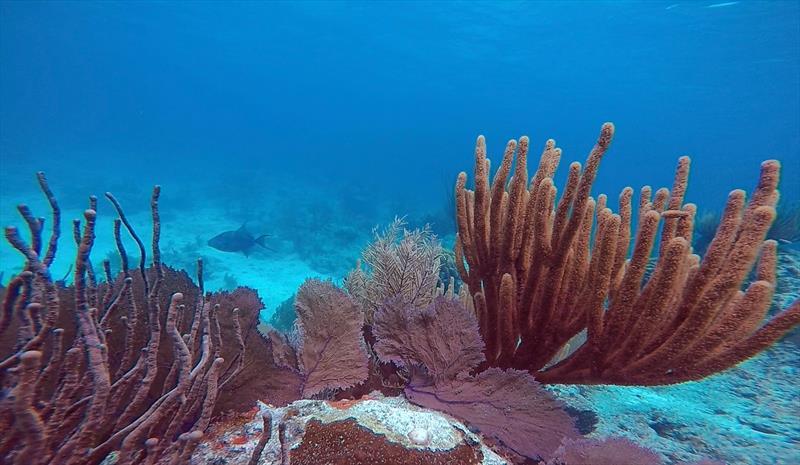
History repeats as coral reefs are devastated
by Melissa Lyne 4 Sep 2020 05:38 PDT

Sea fans—softer-bodied coral relatives—colonising a dead stony coral framework © David Paz-Garcia
A new study on coral evolution has found climates similar to what we're seeing today have previously devastated hard-bodied corals—the architects of coral reefs—while making way for their softer-bodied relatives.
The study traced the evolution of corals over the past 770 million years and found warmer and more acidic waters had a dramatic effect on the diversity of corals and sea anemones.
Hard or 'stony' corals that are the engineers of modern tropical reefs could only proliferate when ocean conditions allowed them to construct their stony skeletons. When conditions did not favour these reef building species, other diverse softer corals and sea anemones flourished.
The international team leading the research includes biologists from Harvey Mudd College, American Museum of Natural History, the Smithsonian's National Museum of Natural History, and the ARC Centre of Excellence for Coral Reef Studies at James Cook University (Coral CoE at JCU).
Co-author Dr Peter Cowman, from Coral CoE at JCU, says the findings are consistent with observations from today's reefs, which are threatened by climate change and other human activities.
"Human carbon emissions are already devastating coral reefs today," he said.
The rising levels of carbon dioxide in the atmosphere are warming and acidifying the waters, making them less hospitable for the hard corals and other organisms with shells and skeletons.
In the past, the soft-bodied species fared best after reef crises—at times when up to 90 percent of reef-building organisms died off as the oceans warmed and became more acidic.
However, though these softer-bodied species may be able to better adapt to climate change than stony corals, they don't form large reefs.
The composition of corals on reefs has already undergone marked change—the Great Barrier Reef is not what it was 30, 10 or even five years ago.
"What we're seeing now are changes in coral communities on reefs in response to the immediate threats of climate changes, like warmer waters," Dr Cowman said. "On evolutionary timescales, changing ocean chemistry may make it more difficult for hard corals to grow, leading to more fundamental shifts in reef species."
The new genetic analyses show that corals and sea anemones have been on the planet for 770 million years—250 million years before the earliest undisputed fossil evidence of their existence. In this time, they experienced massive shifts in climate, fluctuations in ocean chemistry and several mass extinctions.
The team examined how past conditions affected coral and sea anemone diversity, using a new molecular approach. They compared nearly 2,000 key regions of genomes to discern the evolutionary relationships between species.
The team analysed hundreds of specimens from around the world that are now stored in museum collections. When the molecular data was aligned with fossil evidence, it revealed how these diverse animals evolved over deep time.
Losing hard, reef-building corals has devastating impacts on the communities who depend on coral reefs and the rich, complex ecosystems they support for fishing, shoreline protection and tourism.
Lead author of the study, Dr Andrea Quattrini, research zoologist and curator of corals at the National Museum of Natural History, said corals suffered extinctions in the past when the climate posed challenges.
"We'll likely see that in the future," Dr Quattrini said. "The best way to protect them is to curb our carbon emissions."
Co-author Dr Estefanía Rodríguez, a curator at the American Museum of Natural History, said the study shows how nature—through evolution—is able to adapt, survive and reinvent itself.
"The question is whether we will be able to adapt and reinvent ourselves once nature, as we currently know it, is not there anymore," Dr Rodríguez said.
Paper
Quattrini A, Rodríguez E, Faircloth B, Cowman P, Brugler M, Farfan G, Hellberg M, Kitahara M, Morrison C, Paz- García D, Reimer J, McFadden C. (2020). 'Paleoclimate ocean conditions shaped the evolution of corals and their skeletons through deep time'. Nature Ecology & Evolution. DOI: 10.1038/s41559-020-01291-1.